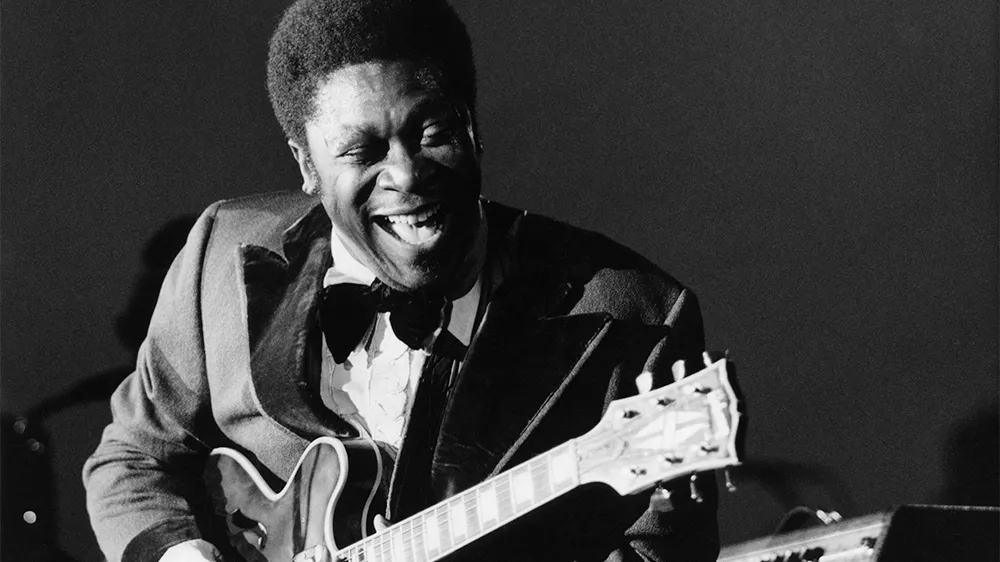
When B.B. King died in May 2015 at the age of 89, his Variety obituary hailed him as “the ‘King of the Blues,’ who helped define his genre’s electrified postwar sound and became the music’s best-known international ambassador.” That’s a far cry from his first appearance in these pages on June 2, 1954, a review of his New York debut at Harlem’s Apollo Theater the previous week that described him as a “rhythm & blues disker” who “twangs a guitar to accompany his modest vocalizing.”
Today, as the world marks what would’ve been King’s 100th birthday on Sept. 16, it seems ludicrous that anyone would call his powerful vocals “modest” or his wailing guitar twangy. But while he’d already notched three No. 1 hits on the Billboard R&B charts at that point in 1954 (including the classic “3 O’Clock Blues”), he wasn’t anything resembling a household name. In fact, it would be more than 15 years before he would break through with “mainstream” (i.e., white) audiences with the hit single “The Thrill Is Gone,” which peaked at No. 15 on the Billboard charts in 1970 and won him his first Grammy.
King went on to be awarded 14 more Grammys, as well as a lifetime achievement honor, and play for numerous heads of state, including three U.S. presidents and Queen Elizabeth II, as well as Pope John Paul II. His 1965 album “Live at the Regal,” a modest hit when first released, is now widely regarded as a seminal blues classic, and he released his most successful album, 2000’s “Riding With the King,” a double-platinum collaboration with Eric Clapton, at the advanced age of 74.
“He is a man that many people loved, he is a man that loved many people, and he is a man that loved bringing his audience together and playing his goddamn guitar,” says veteran music producer Vassal Benford, chairman of the B.B. King estate. “I’ve never heard one bad word about him from anybody.”
The love continues more than a decade after his passing. The city of Memphis, Tennessee — where the man born Riley B. King rose to prominence as a deejay and performer on the pioneering Black radio station WDIA and adopted the B.B. moniker (a shortened abbreviation of “Beale Street Blues Boy”) — marked his centennial with a “100 Days of Blues” series of live music events this summer. And in recent years, King’s estate has launched branded products ranging from clothing and guitar picks to a signature line of bourbon and whiskey.
Benford and the estate are currently developing a King biopic through his Benford & Canton Studios, founded with producer Marc Canton (“300,” Starz’s “Power”), which they plan to put in production next year. It will be accompanied by a soundtrack album featuring contemporary artists putting a modern-day spin on King classics.
In the meantime, blues guitarist and singer Joe Bonamassa has put together a more traditional musical tribute, titled “B.B. King’s Blues Summit 100,” a 32-track album of songs made famous by King featuring an all-star lineup including Clapton, Slash, Buddy Guy, Chaka Khan, Michael McDonald, Susan Tedeschi & Derek Trucks, George Benson and Kenny Wayne Shepherd. The first five tracks were released digitally on his birthday, and five additional tracks will be released each month prior to the album’s physical and full digital release on Jan. 9.
“I owe King a debt of gratitude for what he did for me,” says Bonamassa, who first shared a stage with King in 1989 when he was 12 years old. “This is paying it forward and trying to do what he told me to do, which is keep the music going, keep the blues alive and keep on the right track.”
King didn’t arrive on the scene fully formed. Early in his career, he was known as a singer, not a guitar player, and he remained genuinely insecure about his playing abilities, frequently lamenting his “stupid fingers.” But his signature crying bends and stinging, trilling vibrato — initially developed because he couldn’t play slide like other blues artists — influenced generations of guitarists.
“His tone was almost the same tone on the guitar as it was in his singing,” says Bonamassa. “It was just a natural extension of his voice.”
U2 lead singer Bono got to experience the power of that voice firsthand when the band collaborated with King on the single “When Love Comes to Town,” released in 1989.
“I gave it my absolute everything I had in that howl at the start of the song, and then B.B. opened his mouth, and I felt like a girl,” recalled Bono in the 2014 documentary “The Life of Riley.” “We had learnt and absorbed, but the more we tried to be like B.B., the less convincing we were.”
In the 1988 documentary “U2: Rattle and Hum,” King tells Bono, “I’m no good with chords.” Of course, King could play chords — he had backed himself as a solo act busking on the sidewalks of his hometown of Indianola, Miss. — but he preferred to focus on what he did best and give each task his full attention, playing only lead lines on his guitar and never singing and playing at the same time.
“B.B. was a specialist and had a pure and unmistakable guitar style,” U2 guitarist The Edge tells Variety. “You would know within a note or two that it was B.B. playing, and that’s in a music that is so studied and plagiarized. To be one of the defining voices of an entire genre of music is no mean feat. I’m very happy he didn’t waste any time branching out into other styles. As Keith Richards says, ‘All the greats specialize.’”
During his first three decades in the biz, King played 250-300 concerts a year, including an astounding 342 shows in 1956. His pace slowed to 175 a year as he approached his 80s, but in the last five years of his life, he was still averaging 75 concerts annually. As he lay on his deathbed at his home in Las Vegas in 2015, suffering from various maladies including Type 2 diabetes and dementia, King was still insisting he needed to get back out on the road, in part because he felt an obligation to support his band and his crew. He was also driven by a desire to live up to the expectations of his undemonstrative father, Albert King, a farm laborer who, when his son complained about his relentless touring early in his career, said, “How can a man work too much?”
Even as a boy, King was always on the move. He was born on Sept. 16, 1925, on a cotton plantation near Itta Bena, Miss. After his parents split up when he was four, he bounced between the homes of various relatives with his mother, Ella. When she died in 1935 at the age of 31, likely from diabetic complications, he went to live with his maternal grandmother, Elenora, who died five years later. It was around this time that 14-year-old King formed his first musical group, the Elkhorn Jubilee Singers, with two classmates and a cousin. He later sang and played guitar – a secondhand Stella acoustic purchased with money earned picking cotton – with Famous St. John Gospel Singers, an Indianola-based quintet that performed at churches and radio stations. Following a stint in the Army during World War II, King abandoned his job on a cotton plantation after he crashed a tractor and moved to Memphis to seek his fame and fortune as a musician. He was aided by blues singer and guitarist Bukka White, a cousin 19 years his senior who helped him get a job at a factory that manufactured underground gasoline storage tanks and introduced him to the local music scene.
King’s musical influences were much broader than those of most prominent blues artists who emerged from Chicago or, like him, the Mississippi Delta region. In addition to bluesman Blind Lemon Jefferson and T-Bone Walker, his long list of inspirations included jazz guitarists Lonnie Johnson and Charlie Christian, the big band stylings of Duke Ellington, jump blues king Louis Jordan, balladeers like Nat King Cole and the Ink Spots, and even cowboy actor-singer Gene Autry.
In the early-to-mid 1960s, King and his large, suit-clad, horn-laden band were still toiling in relative obscurity playing to audiecnes that were almost exclusively Black on the “chitlin circuit,” while more down-home, straight-up, stripped-down blues artists like Muddy Waters, Howlin’ Wolf and John Lee Hooker were getting mainstream exposure — and career revivals — thanks to covers by scruffy British Invasion acts like the Rolling Stones, the Yardbirds and the Animals. This corresponded with a demographic shift for the blues, which fell out of favor with young Black audiences, who were turning to new funk and soul sounds, just as young white people were embracing it.
All that changed in early 1969, when an inexperienced young producer named Bill Szymczyk convinced King and his record company ABC-Paramount that he was the man to produce his next album, “Live & Well.” When it was released in June of that year, it became King’s first album to crack Billboard’s Top 100. Their next collaboration, “Completely Well,” released just six months later, spawned King’s signature hit “The Thrill Is Gone.” With that, he was launched into the pop culture pantheon.
For Szymczyk, one of the things that stands out most about King was
his generosity.
“I was a staff producer at ABC at the time, so I wasn’t getting any royalties. Out of the goodness of his heart, he made me half a writer on an instrumental called ‘Friends,’” recalls Szymczyk, who went on to produce a string of classic albums by the Eagles, including “Hotel California.”
The gesture was even more noteworthy given that the heads of King’s previous label, brothers Jules and Saul Bihari of Modern Records, frequently added themselves as co-writers on King’s songs without permission. But that bit of underhanded business was nothing compared to the indignities he regularly endured crisscrossing the Jim Crow South, including one incident where two band members were attacked with a chain and another was stabbed. When truck stops would refuse to serve food to his touring party — a common occurrence — King would use the prospect of losing the sale of gas to fill the 150-plus-gallon tank of his bus as an economic incentive to change their minds.
King’s calm way of dealing with racist slights grated on Tony Coleman, a Black drummer 30 years his junior who joined his band in 1978. Coleman also wasn’t afraid to complain about things like the band having to ride on an old-fashioned bus without reclining seats or bunks.
“I had a lot of confidence in myself, ’cause I knew I could play, but there’s a thin line between confidence and arrogance,” observes Coleman, who likes to say King fired him five times and hired him six. “He taught me how to be patient, how to not be too forceful with my desires, and how to think a little bit instead of react.”
Coleman remembers a rare instance when his boss lost his cool. The band was checking into one of Memphis’ finer hotels, when King — who had been friends with slain civil rights leaders Dr. Martin Luther King and Medgar Evers — heard someone playing and singing the Confederate anthem “Dixie.”
“He told the tour manager, ‘We’re not going to stay here. Put our luggage back on the bus,’” recalls Coleman, who admits he was looking forward to the hotel’s comforts and amenities. “I was like, “Wait, wait … not now!”



